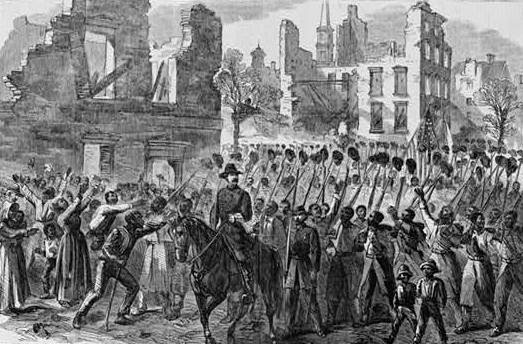In 1989 the movie Glory, starring
Matthew Broderick and Denzel Washington, attracted millions of viewers as it
told the story of the 54th Massachusetts Infantry, the first unit of
African American soldiers to fight in the Civil War. Although it is not as well known, the 54th’s
sister regiment, the 55th Massachusetts Infantry, also built a
remarkable reputation as it participated in various engagements. One member of this regiment was Pleasant
Gibbs, who spent part of his post-war life near Schluersberg and Cottleville.
Massachusetts governor John A. Andrew, a
strong abolitionist and one of the first politicians to advocate the use of African American
soldiers, in early 1863 was given permission by the War Department to form two
regiments of black men. Andrew’s problem
was very simple: a Civil War regiment typically included about 1,200 soldiers,
and there were fewer than 2,000 free black males in the entire state of Massachusetts! So Andrews formed a nationwide recruitment
committee, which included several leading African Americans. These men traveled across the Union states,
advertised in newspapers, and recruited hundreds of black men. Only twenty-two of the 880 men initially
mustered in to the 55th were from Massachusetts. Most came from Ohio,
Pennsylvania, and Virginia.
Pleasant Gibbs enlisted in Company C on June 20, 1863. He gave his age as twenty-two; his home as Harrisburg,
in northeastern Arkansas; and
farming as his occupation. Where Gibbs was recruited and how he traveled to Massachusetts
are mysteries that are lost to time.
However, much information exists about his regiment’s activities during
the war.
One important battle that would forever
change Gibbs’s life was at Honey Hill, South
Carolina, in late November, 1864. His regiment was given an order to charge a
Union battery at the top of a hill. A
member of the regiment described the action as follows in a letter he wrote
home after the battle: “The battery
which the 55th charged was situated on the only road through the
wilderness. Between ourselves and this
battery, on either side of the road, was an impassable marsh. . . . It was like rushing into the very mouth of
death going up this road facing seven pieces of death dealing cannon. Col. Hartwell and all of us knew this. But when commanded to charge ‘twas not his to
refuse, and so waving his hat . . . he smiled and cried, ‘Forward!’ The order was promptly obeyed and in we
rushed cheering and yelling. But ah!
‘twas useless. The cannon on the hill
opened. Shot, shell, grape, and canister
was hurled down the road as thick as hail. . . . 5000 men could not have taken
that battery.” Hartwell’s report stated
that the “road seemed to be swept of everything.” A Savannah
newspaper reported, “We found the road literally strewn with their dead.”
The 55th Massachusetts
Infantry’s strength that day was 502 men.
After the attack, twenty-six were dead, and 110 were wounded, including
Pleasant Gibbs, who was shot in the right shoulder. Because of this wound, he would receive a
post-war monthly pension of $2.66 for the rest of his life. He was discharged on June 5, 1865.
 |
| The 55th Massachusetts enters Charleston, South Carolina, in February, 1865 |
Clues exists which help in understanding why
Gibbs came to the St. Louis area
after the war. One clue is the birth date
of his oldest child, Edward, who was born about 1861. Silvia A. Hall, who is also noted in records
as Gillie, Sallie, and Silvey A., was apparently the mother of this child, and
she was born in St. Charles County. On November
21, 1865, Gibbs married Hall in St.
Charles County. These events and dates seem to suggest that
Pleasant Gibbs had left Arkansas
before 1861 and come to St. Louis;
perhaps he was a runaway slave.
Pleasant
and Silvia Gibbs moved several times between St. Charles
and St. Louis Counties
during their marriage. In 1868 the Gibbs
family, now with two children, was living in the Schluersburg area. By 1870 they had moved to Meramec
Township in St.
Louis County with
their four children. Pleasant was a farm
laborer who owned no land. Both he and
Sylvia could read and write. By 1880 the
Gibbses had moved back to St. Charles
County, this time to
Cottleville. They now had seven
children; all except those younger than seven could both read and write. Gibbs’s occupation is farmer, although it is
noted he is “off work.” Was this a
disability due to his war wound?
Pleasant Gibbs moved to the city of St.
Louis by 1890. Somehow
he was missed in the census of 1900, although his wife is listed as living with
their son Hartwell and his family. Gibbs
died on October 23, 1909,
and was buried in Danville National
Cemetery in Illinois. His wife, who was listed as a laundress
living in St. Louis in the 1910
census, died in 1923. Although not as
well known as the soldiers of the 54th Massachusetts Infantry, Gibbs
and his comrades of the 55th are worth remembering.
Sources: Colored
Paths: Marriages of People of Color: Ex-Slaves of St. Charles County, Missouri,
1865-1871; Federal Censuses, 1860-1920; Gravelocator.cem.va.gov; Library of
Congress; Missouri Census Index of Civil War Veterans or Their Widows
(Bryan Dilts, ed.); Missouri State Census, 1868; Voices of the 55th:
Letters from the 55th Massachusetts Volunteers, 1861-1865 (Noah
A. Trudeau); www.sos.mo.gov/archives/resources/deathcertificates.